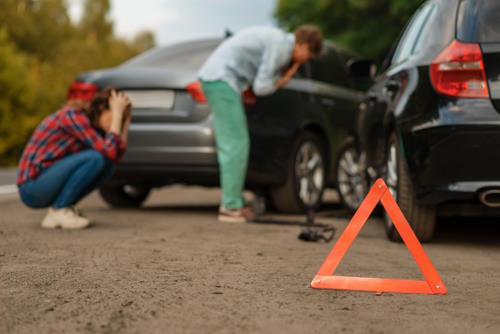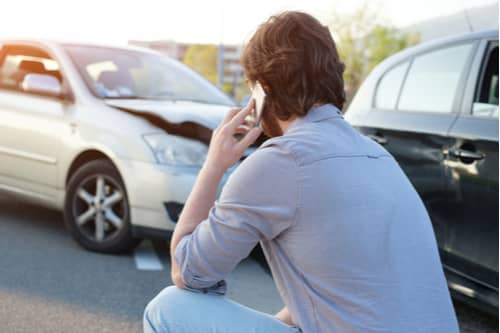- Car Accidents
In some circumstances, an accident victim contacts a Fayetteville car accident lawyer and presents a puzzling situation. The at-fault driver denies liability in a car accident because they claim that they suffered a medical emergency.
This is, indeed, a complex issue because, if the other driver is right, then they cannot be accused of negligence. However, since it is such a convenient way of walking away from responsibility for someone’s injuries and economic damages, the medical emergency defense is often abused.
You will need an experienced Fayetteville car accident lawyer in this circumstance because the at-fault driver’s insurance company will jump at the opportunity to deny your claim. They will believe their client without doing their due diligence to prove that they are exempt from liability in a car accident on these grounds.
Fortunately, the law says that you can still pursue a case and the other driver must defend their claim of being suddenly incapacitated.
Sudden Medical Emergency Doctrine in Georgia
A sudden illness is defined as “an act of God” in the Official Code of Georgia 1-3-3(3). The definition further clarifies that such an act “excludes all idea of human agency.” In other words, a driver is not considered liable for a car accident caused by a sudden medical emergency.
Examples that qualify as a sudden medical emergency behind the wheel include a seizure, stroke, or heart attack causing a driver to lose consciousness.
However, there are other laws and rules that apply in determining liability in a car accident or other personal injury case. For example, a person who invokes an epileptic seizure as the main cause of the accident must prove that they had the right to drive.
In Georgia, the law states that a person with epilepsy may obtain a license:
- For cars and trucks weighing less than 26,000 pounds
- If they were seizure-free for six months.
In situations when the person only has seizures at night, they may be issued a limited license for daylight driving, even if they were seizure-free for less than six months. Moreover, the Department of Motor Vehicles may require the patient to submit regular medical reports as a condition for issuing the license.
The Sudden Medical Emergency Defense
One particular aspect in determining liability in a car accident allegedly caused by a medical emergency is that the driver invoking this exemption has the burden of proof. What does it mean? As any Fayetteville car accident lawyer knows, in personal injury cases the plaintiff must prove that the other party breached their duty of care and caused their injuries and economic damages.
The defendant invoking the sudden emergency doctrine must demonstrate the following elements to avoid liability.
Sudden and Unexpected Emergency
The driver must show that a sudden and unexpected emergency occurred. This emergency should be of such a nature that it was unforeseeable and unavoidable. For example, a sudden onset of a heart attack or a stroke would qualify as a sudden medical emergency.
No Prior Warning
The driver must prove that they had no prior knowledge or warning of the impending medical emergency. If the driver was aware of a health condition that could likely lead to such an emergency, they are responsible for taking reasonable precautions.
For instance, if a driver with a history of seizures failed to take prescribed medication, the sudden emergency defense would not be applicable.
Loss of Control of the Vehicle
The driver must prove that the medical emergency caused them to become physically incapacitated. This means that the medical condition rendered the driver unable to maintain control of the vehicle. This loss of control should be clearly linked to the medical condition, such as loss of consciousness due to a fainting spell or seizure.
Proving Liability for a Car Accident Caused by a Medical Emergency
A medical emergency is not always a defense against liability for bodily injury and economic damages. Here are some ways that a lawyer can show the driver was liable for the accident if the defendant’s insurance company tries to deny your claim.
1. The Driver Was Aware of Their Medical Condition
The sudden emergency doctrine applies to an unforeseeable medical emergency, not a situation that could have been predicted and avoided.
Your lawyer can argue the driver knew they had a health condition that could make them lose control of the car. For example, a person with epilepsy who had been warned not to drive by their doctor or had seizures while driving in the past would probably be held liable.
The driver’s medical records and health history can be crucial in car accident cases involving sudden medical emergencies.
2. The Driver Took Medication that Resulted in Diminished Reflexes
Some medications come with warnings that one should not operate vehicles and heavy machinery after taking them. Anti-anxiety medication is definitely one of these. Thus, even if the condition itself does not generate a medical emergency situation, the prescription medication taken to control it could cause a driver to become impaired and cause a crash.
In this instance, the sudden medical emergency defense is not applicable and does not exempt the driver from liability for the car accident. They should have known that they must not drive after taking the medication.
3. The Driver Had Time to Avoid the Accident
Your Fayetteville car accident lawyer can challenge the sudden emergency defense by showing the driver had time to react and prevent an auto accident. If the driver noticed symptoms but didn’t pull over immediately, they didn’t take reasonable care to prevent a crash.
Witness testimony and accident reconstruction can serve as vital pieces of evidence. Accident reconstruction experts can analyze events leading up to the crash. Witness statements can provide an account of the driver’s behavior just before the wreck.
What Are Your Options of Recovery in These Cases?
If the driver’s claim of experiencing a medical emergency does not hold water, your lawyer will pursue the accident claim with their insurance company. If the insurer continues to believe their client’s assertions and denies your claim, the Fayetteville car accident lawyer will advise you to file a lawsuit against the negligent driver.
In some cases, you may file a lawsuit against the driver’s treating doctor:
- If the doctor knew that the person was unfit to drive and failed to report it
- If the doctor did not warn their patients that the prescribed medication could impair their driving abilities
- If the doctor failed to submit a periodical report for a patient with epilepsy.
You May Recover Damages From Your Own Optional Insurance Coverage
Drivers in Georgia have the option to purchase optional PIP and MedPay insurance for their own protection. If the other driver truly has no liability for a car accident, this is the only option for recovering your economic damages.
This is one of the reasons why it is a good idea to go beyond the minimum insurance requirements. Not all accidents are caused by another driver’s negligence. While these cases are rare, they do happen.
An Experienced Fayetteville Car Accident Lawyer Can Help You!
If you are not sure whether the other driver has liability for a car accident in which you suffered injuries and economic damages, come to Wade Law. We will examine the medical records submitted by the other driver and determine whether they had a sudden emergency.
It’s possible the driver knew the potential risk of a medical event behind the wheel and didn’t take appropriate precautions.
If your case has merits, our Fayetteville accident lawyers will help you file a claim or a lawsuit and recover your damages from the at-fault driver’s insurance. Schedule a free case review as soon as possible!










